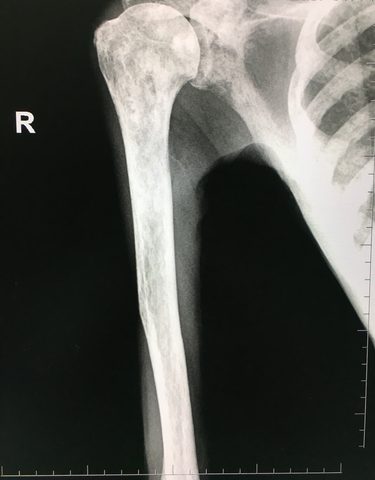A new oral drug in a first-in-human clinical trial has shown promise in inhibiting the bone degradation caused by breast cancer cells, say researchers from the University of Utah’s Huntsman Cancer Institute.
“When breast cancer spreads to the bones, it causes destruction of the bone. It’s a similar process to what happens in osteoporosis [bone degradation due to hormone or vitamins deficiency], except to a much greater extent,” senior researcher Alana Welm said in a press release. “The cancer causes bone to be eaten up. So you quite literally get holes in the skeleton.”
In a previous study published in PNAS, Welm and her colleagues showed that 40 percent of breast cancers have high levels of macrophage stimulating protein (MSP), which was found to be partly responsible for the formation of bone metastasis in breast cancer.
Now, in the study, “RON kinase: A target for treatment of cancer-induced bone destruction and osteoporosis,” and published in Science Translational Medicine, the researchers described the process behind bone metastasis formation via MSP activity.
They found that a specific receptor called RON, present at the surface of osteoclasts – specialized cells that in healthy people maintain and repair bones – binds to the MSP protein produced by cancer cells. This process activates the osteoclasts, prompting them to produce compounds that destroy bone tissue.
These results were confirmed in breast cancer mouse models, in which depletion of the RON protein almost t0tally reversed the process.
“We found it completely protected the bones from destruction,” said Welm. “We saw probably 10 times less bone destruction, almost down to nothing. Even when the mice got cancer in their bones, the bones stayed in much better shape.”
Next, they tested the impact of RON inhibition in bone degradation with an oral drug, ASLAN002 (BMS-777607), that was assessed in a Phase 1 clinical trial (NCT01721148) for the treatment of advanced or metastatic solid tumors. Animals treated with this drug responded positively, with a better walking ability and reduced incidence of fractures.
The trial’s results showed promise in reducing bone destruction in humans, with few side effects. Although none of the patients enrolled in the study had bone metastasis, all were more than 50 years old and were likely to have age-related bone degradation.
The researchers reported a larger effect in women. Indeed, just one month of therapy reduced bone destruction by at least 25 percent in 72 percent of the women, which was considered effective. Nonetheless, the team must still test the drug in breast cancer patients, especially those exhibiting high levels of MSP.
“With a biopsy, we can actually look to see if the tumor expresses MSP,” Welm said. “About 40 percent of breast cancers express MSP in the tumor, so that would be the population we would try to treat with the drug. If we can help 40 percent of metastatic breast cancer patients, that’s a great step. If we could actually see our work benefit even one person, I would be thrilled.”
These results also suggest that RON inhibitors may treat other cancers involving bone degradation, as well as diseases such as osteoporosis that are not related to cancer. More studies are required to confirm these findings.

